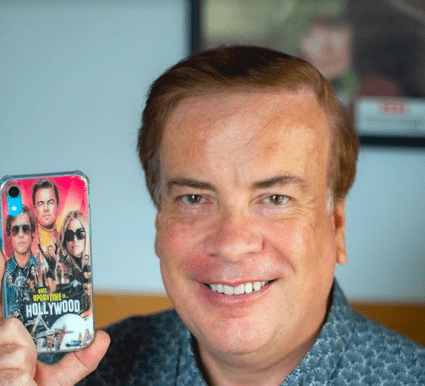Film professor Justin Wyatt shows off his phone case supporting the new Quentin Tarantino film, “Once Upon A Time In Hollywood.” Photo by Grace DeSanti.
A sit-down with film professor Justin Wyatt about Tarantino’s latest film.
“Movies have become a part of my culture,” Justin Wyatt, associate director of the Harrington School of Communication and Media said. “Like my phone.”
He holds up his phone, and on the back of his case is the poster for “Once Upon a Time in Hollywood.” Anyone who has heard him talk about the film before would not be shocked to find it there.
Wyatt is also a film
The film, directed by Quentin Tarantino, is about Rick Dalton (Leonardo DiCaprio), a struggling actor in Los Angeles and his best friend and stunt double Cliff Booth (Brad Pitt). Rick and Cliff live next door to Roman Polanski and Sharon Tate. If you know anything about Sharon Tate it probably has to do with her murder by the Manson family.
The star-studded cast and famous director attracted many people to watch the film. Tarantino is known for directing films such as “Pulp Fiction,” “The Hateful Eight” and “Kill Bill.”
“A long time ago ‘Pulp Fiction’ came out and it redefined what independent American cinema was. I loved that film, and I liked [Tarantino’s] follow up film Jackie Brown,” Wyatt said. “But it seemed to me that over the next 20 years, that basically we were getting the same Tarantino movie, but in different genres.”
Wyatt was underwhelmed by some recent Tarantino films, but when he went to see “Once Upon a Time in Hollywood” he was pleasantly surprised by the film.
“My hopes were pretty low, but because I am a film professor what I say is that even if a movie is a failure there is something to learn from that,” Wyatt said. “First of all, I liked it more than a lot of [Tarantino’s] films because I think DiCaprio and Pitt are really great actors. You don’t just hear Tarantino, you hear the characters as well.”
The star studded cast drew many to watch the movie and while they added to the quality of the film, it was the setting and history surrounding the story that impressed him.
“One aspect that I really became fascinated with was the depiction of the time,” Wyatt said. “1969 is kind of the end of the studio system and the rise of independent production in Hollywood. The way that Tarantino paints that change in the industry is so vivid and so right.”
Wyatt also liked how Tarantino was about to recreate 1969 Los Angeles. “A lot of these places still exist, but he was able to create a production design and create detail and costuming and all these small details that speak of the period,” he said.
Wyatt left the theater excited about the film and wanted to share his excitement with his friends. So he posted about the film on Facebook. Although, when he posted about it people were not as enthusiastic about the film.
“I posted on Facebook about it, and oh my god, you would think I was running down the street naked and yelling,” Wyatt said. “The reaction that I got stunned me. I gave a few examples of why I liked the film and then I got this response back that was comment after comment. Though some people agreed, those who didn’t really hated it. There were two different things they hated. Either they just hated Tarantino and they would have hated it either way. But the other group thought the Bruce Lee scene was racist.”
The scene Wyatt referring to is a recollection Booth has of Bruce Lee. In the scene, Tarantino makes fun of Lee by poking fun at his persona in what Wyatt refers to as a “fun and interesting way.” Others feel this scene is racist and takes away from who Lee was for a cheap laugh.
When Wyatt was confronted with the negative comments he decided to delete the post.
“I felt that people had shown up to my Facebook post, and shared all of their negative thoughts,” Wyatt said. “Maybe they should have put it on their page and not mine. I felt like the response to this is kind of like what’s going on in the nation. Rather than trying to have a dialogue, people just want to yell their critical opinion in your face until you back down.”
Throughout this negative experience, Wyatt held onto his love of the film.
“I see other movies and then two hours later I forget about them, there’s nothing there,” Wyatt said. “This is something that I can sink my teeth into, enjoy, and think about.”




